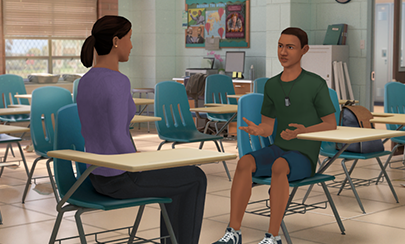Overview
According to the 2016 National Survey of Children's Health, nearly 35 million children and teens in the U.S. have experienced at least one type of serious childhood trauma. Preparing school staff to recognize and respond to students who have experienced adverse childhood experiences is essential for each student to achieve their potential.
Trauma-Informed Practices educated teachers and staff about the effects of trauma and children and the developing brain. It prepares users to spot warning signs of trauma, lead real-life conversations with students, improve their experience in class, and explore making a referral to a mental health professional. Users will have access to customized national, local, and school-specific resources in addition to simulation content.
The goal of Trauma-Informed Practices is to create a trauma-sensitive school culture.
Learning objectives:
- Increase knowledge and awareness about the types of experiences that can cause distress or trauma, and how these relate to brain development
- Recognize when a student's behavior might be the result of trauma or distress
- Lead conversations with a student about how they might be feeling
- Problem-solve ways that their class or school can become a more comfortable place for students who have experienced trauma
- Assess the need for referral, motivating students to seek help when needed
- Consider educators' own needs for self-care
Research shows that with experiential practice, increased emotional engagement and reflective thinking leads to stronger self-efficacy and behavior change.
This simulation was developed in collaboration with UNICEF USA and the Center for School Behavioral Health at Mental Health America of Houston.
Users receive customized feedback based on their in-simulation choices.
The simulation is available online 24/7. Users are asked to complete pre-, post-, and 3-month follow up surveys to assess changes in skills. Attitudes, and behavior. Upon completion, users receive a certificate of completion. Clients have access to usage reports and evaluation data via the Kognito client portal.

Download the PK-12 Catalog
View our full catalog of simulations created to improve PK-12 communities.





